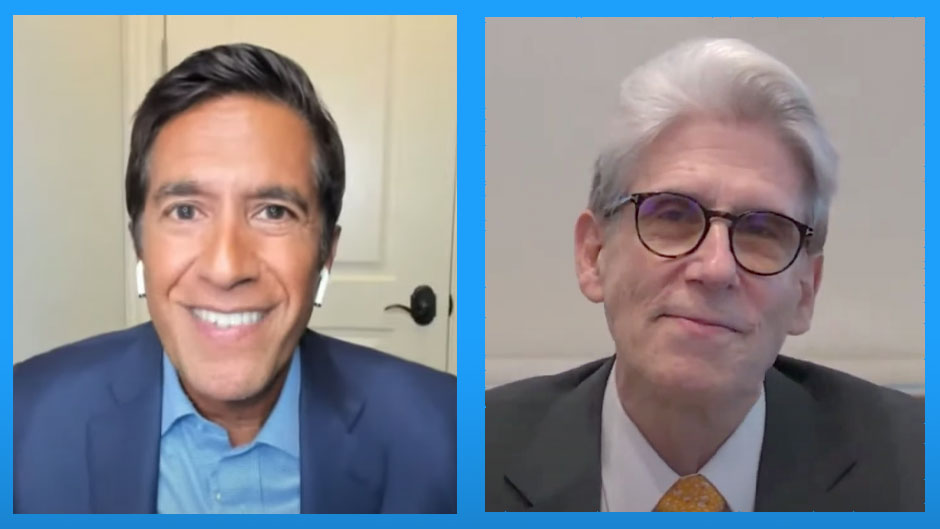University of Miami President Julio Frenk joined a panel of public health experts Tuesday to discuss the growth of misinformation that has plagued the COVID-19 pandemic since it began.
During the Wikipedia movement’s annual conference, “Wikimania,” Frenk told moderator and CNN chief medical correspondent Dr. Sanjay Gupta he laments the fact that political leaders across the world have deliberately hidden or distorted information from the outset of the COVID-19 epidemic.
“Not just in China originally, but all over the world, you saw in country after country that leaders were minimizing [the pandemic], saying it’s going to be gone, and creating a vacuum of information that is filled by these other sources that are not credible. And that to me has been pretty unusual,” he said.
This period of concealing critical information prompted a breakdown of trust in these world leaders, panelists said. This later undermined the implementation of evidence-based public health measures that were and are needed to save lives. And Frenk—who served as Mexico’s Minister of Health and then as Dean of Harvard University’s T.H. Chan School of Public Health before joining the University—has the unique perspective to compare the global COVID-19 response with previous outbreaks. Frenk said he has been working to provide clear and consistent information about COVID-19 to the University’s students, faculty, and staff through more than 50 video messages because during past epidemics he learned the importance of communication.
“What I had not seen until this pandemic was the active politicization of public health,” said Frenk, a global epidemiologist who has been in a leadership role through five pandemics. “I’m very disturbed about that because where we are lagging in our response globally—even in the wealthiest countries. It’s because of that politicization of the response. It started with face coverings, and it’s now going into the active promotion of disinformation about vaccines.”
Frenk made these remarks during the panel discussion “Preventing misinformation during the COVID-19 pandemic: How Wikipedia, public health experts, and news media can collaborate to share trustworthy knowledge in times of crisis.”
During the pandemic, Wikipedia partnered with the World Health Organization (WHO) to improve its credibility and accuracy on COVID-19-related articles. It also now limits the editors on all medical articles, so information is more precise and is linked to a reliable source, said panelist Dr. Netha Hussain, a neuroscientist who is also an active contributor to Wikipedia’s English-language medical articles. Also on the virtual dais was Dr. Peter Singer, special advisor to the director-general of the WHO, and Elaine Nsoesie, an assistant professor of global health at Boston University who studies how health information is communicated through nontraditional media sources, like Google, social media, and mobile phone applications.
Frenk categorized the spread of baseless information into four areas: misinformation, which is untrue information rooted in ignorance or prejudice; disinformation, or the deliberate distortion of reality to serve an agenda of some sort; hypoinformation, where governments hide data to preserve their reputation or to avoid the financial consequences of revealing that they have an outbreak or a pandemic; and hyperinformation, or an overflow of content—sometimes from contradictory sources and magnified by the widespread availability of information, which can create confusion.
“Of course, what we’ve seen in this pandemic is what one could really call hyperinformation,” he said.
Gupta also asked WHO representative Singer how the organization is working to combat the growth of misinformation about COVID-19. Singer responded that it is actively partnering with social media giants like Facebook, Twitter, and TikTok, as well as traditional media outlets and community organizations, to distribute accurate public health information about COVID-19.
“We are pushing out accurate information in partnerships through social media and traditional media to billions of people to try and improve their health and improve the justice and equity in our fight against COVID-19,” Singer said.
Like Frenk, Singer also pointed to leaders, both local and national, as the role models who can really turn the tide on the pandemic. They can help people realize that following the advice of scientists to wear masks and get vaccinated are the best ways to end the pandemic, he noted.
“Pandemics start and end in communities. So, leadership matters—from heads of state to community leaders,” Singer said. “In some ways leadership is what’s underlying all this and that’s the most effective vaccine for all of this.”
Still, Frenk and others expressed hope that COVID-19 may push the world to adopt new practices for future pandemics, like global standards for reporting about new pathogens.
“Every time a country delays the reporting of cases because they don’t want to create a panic or suffer economic consequences, every time a country behaves irresponsibly, that country puts everyone else at risk,” Frenk said.

